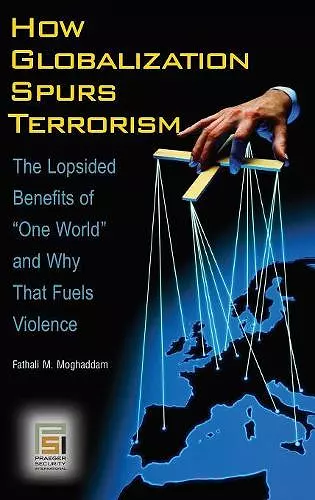How Globalization Spurs Terrorism
The Lopsided Benefits of One World and Why That Fuels Violence
Format:Hardback
Publisher:Bloomsbury Publishing PLC
Published:30th Aug '08
Currently unavailable, and unfortunately no date known when it will be back

"Moghaddam has given us the Big Picture for better understanding radicalization and terrorism in the 21st century. His psychological analysis shows the deep wounds being inflicted by 'lop-sided' globalization, and the irrational reactions that can arise from people experiencing threatened identities and what they see as possible extinction for their way of life. This book also points to the vital role of women in developing a better future in the Islamic world, and to the importance of resolving the New Global American Dilemma-a dilemma associated with the rhetorical American support for freedom and democracy around the world, while at the same time propping up 'friendly' dictatorships." -- Paul R. Ehrlich, Bing Professor of Population Studies and professor of biological sciences at Stanford University,^Lmember of the National Academy of Sciences and recipient of the Crafoord Prize, an explicit substitute for the Nobel Prize in fields of science in which the latter is not given. "Fathali Moghaddam provides us with a welcome long-term, global view of the processes underlying terrorism. Readers will find this a novel approach to promoting the peaceful resolution of conflict in the context of fractured globalization, where an emerging global community is countered by a retreat to ethnocentrism and fundamentalism as socio-cultural and religious groups struggle to protect their social identities." -- Richard Wagner, Editor, Peace and Conflict: Journal of Peace Psychology
This book explores modern Islamic terrorism in the context of globalization and cultural evolution.
This book explores modern Islamic terrorism in the context of globalization and cultural evolution. 21st century terrorism is different and new, first because it relies heavily on electronic communication systems and other aspects of modern technologies, and second, because it is in large part a product of fractured globalization, with its associated threats to the collective identity of Muslims. Part one of this work contrasts globalization as an ideal with globalization as it is actually taking place, with its enormous contradictions and threats. Moghaddam, a longtime and highly respected terrorism and conflict researcher, argues that globalization is resulting in serious threats to the basic psychological needs of some, particularly in connection with collective identity. Part two explores how globalization has brought sudden contact between different groups with no previous history of large-scale contact, resulting in a rapid decline in diversity. Terrorism is one of the dysfunctional defense mechanisms of people in such conditions, facing external threats. Part three describes long-term solutions, focusing particularly on the role of women and the nature of the family in traditional Islamic societies. Moghaddam shows us why globalization is resulting in what he calls catastrophic evolution, the rapid decline and disappearance of minority cultures and languages, and why that brings a clash of ideologies and the rise of extremism. There are also other dangerous trends, and those call for inspired solutions, springing from an understanding that traditional conflict-resolution, evolved in the shadow of the Cold War, is no longer effective and needs to chaIncreasing globalization encourages terrorism, and the idea of 'one world' fuels violence: that's the concept in How Globalization Spurs Terrorism, which analyzes modern Islamic terrorism in the context of increasing world connections. College-level libraries strong in global studies will find this a fine acquisition. * The Midwest Book Review *
ISBN: 9780313344800
Dimensions: unknown
Weight: 482g
208 pages